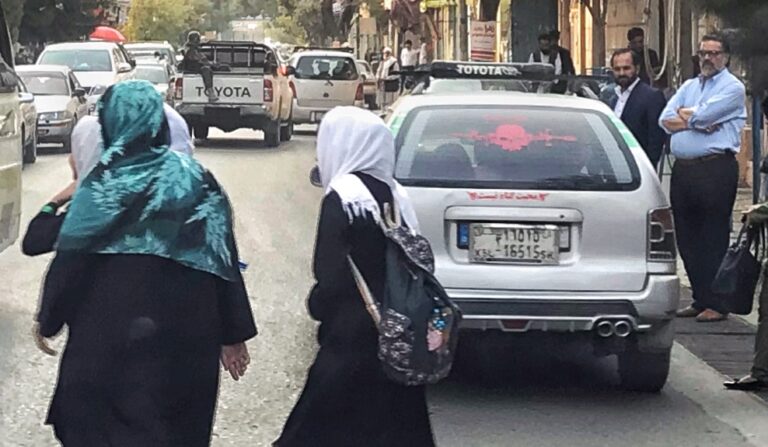Eight months after the Taliban takeover of Afghanistan, hope is paused as new policies restricting women are confirmed. These include an ongoing ban of secondary school for girls and increasingly stringent male escort requirements. Arzo Bahar, the president of the Female Staff Association of the Swedish Committee for Afghanistan, describes her experience as a working woman and mother, and the fears she has for her daughters.
It’s been a couple of especially difficult weeks in Afghanistan. In March, we saw a number of policies confirmed from the Islamic Emirate restricting women further, such as prohibiting travel without a related man, and even dictating where women sit in the car (hint: not in the front seat). We learned that still – or again – our daughters above age 12 couldn’t go to school. We learned this when, after months of closure, they were dressed, fed, with backpacks on at the doors of schools, in some cases already in classrooms in the middle of a lesson. They were told to return home. The internet filled with pictures of crying daughters, fathers, and mothers, the hallways of workplaces and homes were somber. In my family we are five daughters, with our own daughters. It was very quiet in our home that night.
I am the president of the female staff association of one of Afghanistan’s largest NGO’s – the Swedish Committee for Afghanistan. On August 15, 2021, our whole staff was sent from work. I am back to work. In fact, I was within two weeks. Not easily, not without maneuvering new restrictions and an often fear-inducing environment. But yes, we are back. In fact, I’ve been promoted, and our staff is actively trying to increase our fragile number of female colleagues. The number was small to start, and many were lost to evacuations, some still trying to leave. But in general, in my workplace, we are back.
In March, we saw our teenage daughters sent home from school, and we wondered whether we, also, would eventually be sent home again.
Both women and men in Afghanistan have learned again and again to have hope. Yet it is never easy to cope at that moment when hope seems lost. We’ve also learned, like many groups, that our rights will not be given to us. My generation is seeing this clearly now, after the last 20 years. Those decades of hope and right-giving proved so fragile. In 1996, when the previous Taliban regime seized power, our mothers and grandmothers were forced home. Would it happen, now, to us and to our daughters? When would this black cycle end? The international community made and broke promises – would the Islamic Emirate keep theirs?
When the takeover initially happened, fear was pervasive. Fear of the poverty that the international withdrawal would inevitably mean. Fear for lives, not knowing how brutal the takeover would be. Fear for our psyches; would our children be traumatized, like our parents? Would I, a young female parent, suddenly my extended family’s sole breadwinner, be able to cope with the pressure, materially and mentally? Should we leave the country? But – how?
Time passed, and the Islamic Emirate was limiting its pressure. We waited. Yes, there were searches, disappearances, confusions and abuses connected to a lack of established legal systems and lack of trust. Yes, we heard of street beatings, women harassed to change their attire or position in the car. Yes, protests – and protestors – were silenced. Yes, our teenage daughters sat at home. We felt every hour wasted. Some self-policed, staying at home simply because they did not know what to fear, or not to fear. We saw the poverty rate rocket to over 90%, with dire warnings from the UN. Cash dried up and queues at banks and visa and passports offices increased, go-betweens charging desperate people sometimes over 1000% the cost of passports and visas. We waited. Over two million of our citizens left the country. The rest of us waited.
The Islamic Emirate seemed to be attempting to organize governance, the international community seemed back to engage. Time did what time does, and after six months, families started to shake the grief of change, review the new environment, and think about survival and growth. Spring was coming, we were tired of waiting, and – as we Afghans do – we hoped. Again.
So what do the official restrictions mean? For example, what does it mean for a woman not to be allowed to travel without a “mahram” (male family)? Well, in my family of five daughters, it means that some cannot go to university. How can all families have enough men to constantly escort women, and in this economy, how can men – or women – take time off from productivity to travel together? A woman, say a project manager in my organization traveling to a province to monitor schools – is her husband or father or brother to put his university or work aside for hers? Who will sacrifice?
Every day that girls stay out of secondary school, what does this mean for destitute families, for whom schooling was the only incentive not to give their daughter away in early teens for the few hundred dollars of a bride price? What does increased early marriage mean for maternal and infant mortality rates, malnourishment, and soaring birth rates for families ever less equipped to deal with them?
What, for women and for Afghans, will the Islamic Emirate’s new spring policies mean, and what will the rest of the year bring?

